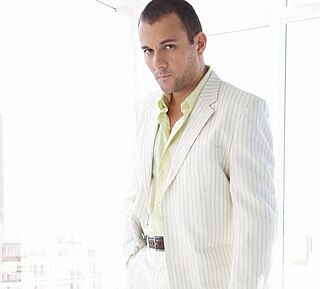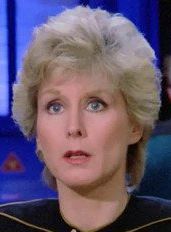Related Research Articles

Voice-over is a production technique where a voice—that is not part of the narrative (non-diegetic)—is used in a radio, television production, filmmaking, theatre, or other presentations. The voice-over is read from a script and may be spoken by someone who appears elsewhere in the production or by a specialist voice actor. Synchronous dialogue, where the voice-over is narrating the action that is taking place at the same time, remains the most common technique in voice-overs. Asynchronous, however, is also used in cinema. It is usually prerecorded and placed over the top of a film or video and commonly used in documentaries or news reports to explain information.

The American Federation of Television and Radio Artists (AFTRA) was a performers' union that represented a wide variety of talent, including actors in radio and television, radio and television announcers and newspersons, singers and recording artists, promo and voice-over announcers and other performers in commercials, stunt persons and specialty acts—as the organization itself publicly stated, "AFTRA's membership includes an array of talent". On March 30, 2012, the members of AFTRA and of the Screen Actors Guild (SAG) voted to merge and form SAG-AFTRA.

In the performing arts industry such as theatre, film, or television, casting, or a casting call, is a pre-production process for selecting a certain type of actor, dancer, singer, or extra for a particular role or part in a script, screenplay, or teleplay. This process may be used for a motion picture, television program, documentary film, music video, play, or advertisement, intended for an audience.
A background actor or extra is a performer in a film, television show, stage, musical, opera, or ballet production who appears in a nonspeaking or nonsinging (silent) capacity, usually in the background. War films and epic films often employ background actors in large numbers: some films have featured hundreds or even thousands of paid background actors as cast members. Likewise, grand opera can involve many background actors appearing in spectacular productions.
An Equity card is proof of membership in the Actors' Equity Association of the United States or Equity in the United Kingdom.

Leslie David Baker is an American actor. He is known for playing disgruntled paper salesman Stanley Hudson in The Office for nine seasons (2005–2013).

Backstage, also previously written as Back Stage, is an American entertainment industry trade publication. Founded by Allen Zwerdling and Ira Eaker in 1960, it covers the film and performing arts industry from the perspective of performers, unions, and casting, with an emphasis on topics such as job opportunities and career advice. The brand encompasses the main Backstage magazine, and related publications such as its website, Call Sheet —a bi-monthly directory of talent agents, casting directors, and casting calls, and other casting resources.

Stelio Savante is a South African actor and filmmaker that has appeared in 140 films and series in the last three decades. He is known for his roles as a South African/Israeli journalist and undercover Mossad agent opposite Jim Caviezel and Claudia Karvan in the political thriller Infidel, a Portuguese mayor opposite Matt Dillon in the Hawaiian drama Running for Grace, a small town deputy directly opposite Cress Williams, Kellan Lutz and Anne Heche, in her final film performance in the noir What Remains, and a rogue policeman in the South African epic drama Colors of Heaven. In 2007 he became the first male South African-born Screen Actors Guild award nominee for his recurring role on Ugly Betty followed by roles in the studio films My Super Ex-Girlfriend and Starship Troopers 3: Marauder. He is also known for the roles of Moses in the biblical series The Chosen, and the voice of Ajax in the popular video games Call of Duty: Black Ops 4 and Call of Duty: Mobile.

The Stage Directors and Choreographers Society (SDC), formerly known as Society of Stage Directors and Choreographers (SDC), is an independent national labor union established in 1959, representing theatrical directors and choreographers working on Broadway, National Tours, Off-Broadway, and in various resident, regional, and stock theatres throughout the United States.
An audition website aggregates acting, modeling, and dancing auditions online. One of the most significant organizations for professional screen and theater casting in the United States is the Casting Society of America (CSA).

Carolyne H. Barry was an American dancer and dance instructor.

Justin Blanchard is an American actor who has performed in television, film, theatre and radio. He is a member of SAG-AFTRA and the Actors' Equity Association.
Jan Russ is an Australian casting director, producer and actress of theatre and has briefly appeared in television guest roles. She is best known as the casting agent for various program's for Grundy Television/Fremantle Media, and is notable for launching the career's of many artists that became international stars.

Submissions Only is a comedy web series about the casting and audition process for Broadway theater. It centers around aspiring actress Penny Reilly and her friend, casting agency director Tim Trull, and their circle of friends, colleagues, relationships and family. The series was created in August 2010 by Broadway performers Wetherhead and Andrew Keenan-Bolger. Wetherhead is the series' writer, while Keenan-Bolger is the main director and editor.

The Screen Actors Guild-American Federation of Television and Radio Artists is an American labor union that reflects the 2012 merger of SAG and AFTRA. It represents approximately 160,000 media professionals worldwide. SAG-AFTRA is a member of the AFL-CIO, the largest federation of unions in the United States. SAG-AFTRA is also a member of the International Federation of Actors (FIA).

Uzoamaka Nwanneka "Uzo" Aduba is an American actress. She gained wide recognition for her role as Suzanne "Crazy Eyes" Warren on the Netflix original series Orange Is the New Black (2013–2019), for which she won an Emmy Award for Outstanding Guest Actress in a Comedy Series in 2014, an Emmy Award for Outstanding Supporting Actress in a Drama Series in 2015, and two SAG Awards for Outstanding Performance by a Female Actor in a Comedy Series in 2014 and 2015. She is one of only two actors to win an Emmy Award in both the comedy and drama categories for the same role.

Motion-capture acting, also called performance-capture acting and often abbreviated as mo-cap or P-cap, is a type of acting in which an actor wears markers or sensors on a skintight bodysuit or directly on the skin. Several cameras from different angles record the actor's movements simultaneously, recording the three-dimensional position of the sensors without recording the rest of the actor. Sampling is done many times each second, aided by advances in computer technology. The resulting database of 3D points permits a filmmaker or video game creator to create a digital character and place them in an entirely new setting.

Joey Rubenstein is an American internet entrepreneur, composer, touring and recording artist. He is the founder and chief executive officer of Casting Frontier, a digital talent casting platform for the entertainment industry and was the lead guitarist in the American rock band Flourscein.
Robert J. Ulrich is an American casting director and producer active since the 1980s and best known for casting television shows including Glee, The Boys, Zoey's Extraordinary Playlist, Supernatural, Battlestar Galactica, CSI, Diagnosis: Murder and Matlock. He has also cast most Ryan Murphy productions since Popular in 1999. He has been nominated for eight Emmy Awards, winning a Primetime Emmy Award for casting Glee. He has been nominated for the Artios Awards 22 times and won twice, for casting Glee and Nip/Tuck.
Cindy Tolan is an American casting director and producer. Her career began in theatre, before she transitioned to television and film. She was awarded a BAFTA for her work as casting director of West Side Story in 2021. For the film she auditioned 30,000 people in order to create an authentic cast with performers of Latin descent. She is credited with the discovery of Rachel Zegler and for encouraging Ariana DeBose to audition for the production.
References
- ↑ "Talent Finds Tape is Taking Over the Town". variety.com.
- ↑ "Digital Casting, Poised for a Role Beyond Hollywood". nyfa.edu.
- ↑ "Your Guide to a Perfect Self-Tape". backstage.com.
- ↑ "Stage Gauges Online Casting". variety.com.
- ↑ "If You Can't Attend an Open Call Audition, send us a video!". nbcthevoice.com.
- ↑ "Casting Goes Digital: The Evolution of 'Self Tape Auditions'". coca-colacompany.com.
- ↑ "Top 10 Reputable Casting Sites". dailyactor.com.
- ↑ "Trusted Casting Websites". barbizoninsider.com.
- ↑ "Digital Casting, Poised for a Role Beyond Hollywood". nytimes.com.
- ↑ "The Final Frontier". backstage.com.
- ↑ "Ryan Gosling Talks Cast It". castitsystemsblog.com.
- ↑ "Screen Actors Guild Launches Digital Casting Revolution". sagaftra.org.
- ↑ "SAG Completes Online Casting Directory". variety.com.